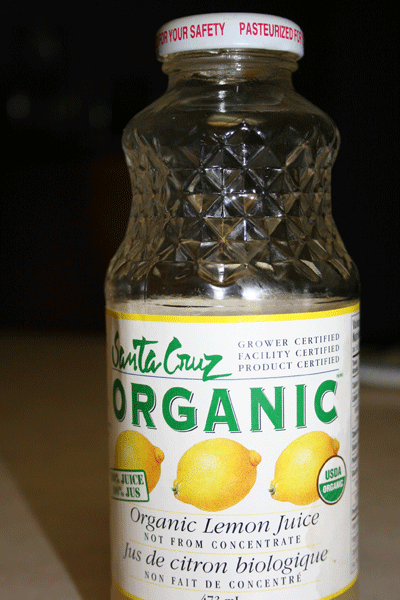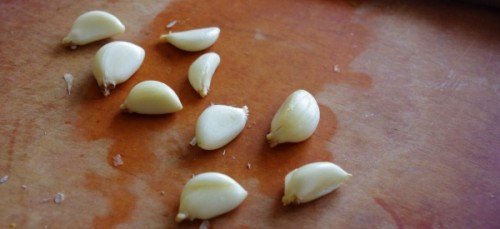Compromising to Make the Budget Work
We all know that grocery budgets are getting tighter as food prices go up (and for some, income has gone down).
This is where frugal mamas need to get creative to make the money
stretch as far as it can, as we continue to make wholesome food a high
priority!

Personally, I'm starting to consider small compromises in what I buy, so that I can keep buying those things that I feel are the most important, nutritionally speaking (such as our raw milk, plenty of free-range eggs, only grass-fed meats and poultry, and lots of fresh veggies).
A few that I've been making lately are:
- Using kamut grain for the bulk of my baking, and also more rye and barley, instead of my preferred spelt (which costs about a 1/3 more than kamut and about double the price of rye and barley). One bonus I've found in this is that kamut is a bit less dry than spelt, and my husband has been enjoying the less crumbly baking. 🙂
- Skipping on the fresh lemons and limes that I prefer (for their high vitamin C and enzyme content), and instead buying bottled organic lemon juice, which makes my dollar stretch quite a bit further and it's organic to boot.
- Buying a bit less fresh fruit, and stocking up on it when I find discounts or great deals. This means we might be eating a whole lot of discounted organic grapefruits for a week, instead of breaking it up with lots of apples and oranges as we'd prefer to. I've also been making more smoothies with the stash of frozen berries we already have in the freezer plus fresh greens, and was so thrilled to find a big box of discounted ripe bananas at the store the other day to help stretch the berries even further!
Those are a few that come to mind. I'm sure I'm not the only one who's looking for little ways to keep costs low!
Edit: Since it seems relevant with the topic and the comments being left, let me link to a previous series I did on Frugality with Food. In it, I examine all of the different methods and strategies that I combine to keep our food quality high and our costs low. Here are the links for Part 1 and Part 2.
Have you found yourself making small compromises in your regular grocery shopping habits? What types of changes have you made, and what things remain as priorities or non-negotiables?



I’ve started to make my own yogurt and buy dried beans instead of canned. I’ve also started to sprout my beans and rice before cooking to increase the available nutrients…for free! This has helped us to stop using so many supplements…which are very expensive.
Hi Stehanie! What a great post! I too have found myself compromising for the sake of the food budget. Your tip on buying the organic lemon juice is a good one! What brand do you like? I have been buying ground turkey in place of ground beef(a savings of $1.50 per lb.)and although it took some getting used to the taste, we actually prefer it now as it is far less greasy than the beef! I also make my own bread, butter and cereal. I find it difficult to compromise on fresh produce, though:( I guess I’ll have to work on that!
Finding out that I have celiac disease and some secondary food allergies completely shot our budget this spring! I’m working really hard to bring it back down to a reasonable, sustainable level. (I actually just started a related blog series — “Food Allergies on a Budget” — exploring how to stretch those grocery pennies.)
* We are eating very simply. No juice, no expensive nuts, fruits, or vegetables. Oranges were on sale last week, so oranges are the only fresh fruit we’ve had this week.
* I compromise with whatever is on sale, instead of having hard-and-fast rules on what I’m willing to buy conventional vs. organic. At least our sources of pesticides are getting swapped around every week. 🙂
* Lots of beans, rice, and lentils, and less meat. Lots of carrots and less bell peppers. More potatoes and less bread. I’ve been working on some cost-analysis documents to figure out which of our favorite meals are cheapest, and working them into the rotation more frequently. For instance, one of my goals is to come up with 8 recipes that rely on beans, rice and/or lentils. Each recipe should be less than $1 per serving and be markedly different so we don’t feel like we’re repeating ourselves. Ultimately I’d like to serve 2 of those 8 recipes per week.
I’m interested to read what everyone else is doing! We don’t all have the same guidelines on how we compromise, but you can often still glean principles that apply to your situation. 🙂
For the first time ever, I planned my summer garden around the most expensive vegetables that we love to eat. Space-hogging okra is out, many-colored bell peppers are in. Space for summer squash and zucchini is minimal; specialty Asian bitter melons, eggplants and and pricy herbs are maximal. Corn=out, heirloom tomatoes=in. I’m also growing more herbs than ever in pots (ok, repurposed kitty litter pails) in my backyard and on the balcony, as I hate to spend the money to buy them fresh.
Pesto, ratatouille, cucumber/tomato salad here we come!
Great post! I am using less meat to stretch the budget. It works great in things like spaghetti, chicken alfredo, tacos, chili, etc. As a general rule, we don’t buy sodas or juice. We drink water or milk. I buy what’s on sale which usually means in season, but not always.
Organic milk is the one non-negotiable for me.
Besides our mortgage payment, food is our next biggest expenditure each month. And with these crazy economic times I have really revamped how we spend money in general and especially how I grocery shop. So far I have cut our grocery bill in almost half!
I went through a period where I bought everything organic, meats, veggies and fruits, milk and snack foods.
I still buy organic products, just less of them. I certainly do not buy organic snacks anymore. Now I rely more on local produce for our fruits and vegetables. We use very little beef in our diets, but buy chicken and ground turkey in bulk….I DO wish there was an organic farm close by that I could buy my meat in bulk!!
I also buy milk that does not have any hormones or antibodies and I also buy it in bulk and freeze it if necessary.
Besides not buy all organics now, the biggest cuts in how I shop are more on the house hold needs, personal hygiene products and baby needs.
I buy our toothpaste, shampoo, deodorant, toilet paper etc at the dollar store. I buy the generic diapers and wipes for the kiddos and I am seriously looking into cloth diapers…..any suggestions on that one?
I also stockpile and use coupons when I can snag items that we USE at a great deal. This helps keep our grocery budget pretty low.
Great topic!!
I also find this hard. Especially as now my toddler is eating a lot more. I have had to compromise on some things that I would like to buy organic, but simply cannot. Its more important that we eat enough food than to not have enough food. I try to buy the things that are on that highest in pesticides list as organic, but sometimes I can’t, so instead I try to use less of it, plan to grow my own, or find a local source that is uncertified but is grown naturally. For example with potatoes. For me the biggest non-negotiable is having enough food to eat. When my husband complains that we don’t have enough food yet the budget is gone, I know there is a problem.
I am also still working on finding out what are the cheapest meals I make that we still enjoy eating, and not using the rest very often. Using a co-op (only available for my dry goods) and stocking up on those sales also helps a lot.
oh yes I forgot to add…do you have a link or other post on using kamut and rye and barley flours and the equivalent for switching from wheat? I also mainly use spelt but would like a cheaper option too.
Nola, I wrote a post last year on that very thing (substituting non-wheat flours). Here it is:
https://keeperofthehome.org/2008/07/the-how-to-of-using-alternative-grains.html
Alexis, the brand of lemon juice I like is the one pictured: Santa Cruz Organic Lemon Juice.
Beth, for some cloth diaper suggestions, check out my Babies category, for some posts specifically on diapering as well as some good links and related topics (just scan through the topics for the diaper related ones):
https://keeperofthehome.org/babies/
Also, there was just a really good series on cloth diapering at Passionate Homemaking. Here are the links:
http://www.passionatehomemaking.com/2009/03/guest-post-cloth-diapering-101-part-1.html
http://www.passionatehomemaking.com/2009/03/guest-post-cloth-diapering-101-part-2.html
I am interested in your alternative grains–how do you substitute kamut for whatever it’s replacing and have you found a a good single location for recipes using these grains. I am a timid experimenter and need hard and fast guidance.
Great post! I know most of you readers probably do this already but I have recently discovered the money-saving benefits of meal planning. The grocery bill has reduced a lot since I mostly only buy what is needed for that week’s meals. We have also found that withdrawing the housekeeping money in cash weekly has been a budget saver – stops all those little trips to the shop where you always end up buying more than you came for!
dried beans rather than canned (better in terms of bisphenol A as well)
bulk aisle for almost everything — flour, nuts, dried fruit
orange juice instead of oranges
making sure not to overeat/emotionally eat (this can really drive up the grocery bill if 3 people are eating like 6 people unnecessarily.)
drinking tea and coffee at home instead of getting it out
having simple desserts like sharing a good dark chocolate bar rather than making expensive fruit or chocolate desserts.
using less oil in my cooking (i realized how much i was spending a month on olive oil alone.)
Food prices have been notoriously high here in California for ever, which seems funny to me since so much of the nation’s food is grown here (other than grains). They just keep getting higher and higher. Our family had to cut back on our entertainment budget to help with the food budget. Everything is made from scratch, which is much cheaper and more filling (in my opinion). We are planting a Victory Garden beginning in May and I hope to do some research to learn how to extend this garden into the winter using cold frames. It won’t eliminate our grocery bill, but it could help it a lot! My blog post today discusses this in more detail.
Freezer stew is a great way to use up every last bit of leftovers. Keep a large container in the freezer and when you have a few bits of food that aren’t enough to save, add them to the container. Like that handful of lima beans, or that spoonful of spaghetti sauce, etc. When the container is full, make freezer stew! You can stretch it by adding pasta, rice, etc. It will taste different every time you have it but we think it has always been delicious.
We are eating more “cheap” meals, like rice covered with refried beans, chopped onions, salsa, sour cream and cheese.
Raw milk and fresh organic vegetables are still priorities…..having a garden is a great way to stretch your food dollars.
… after reading through the comments, I realize that we are INCREDIBLY spoiled…
We have a decent sized garden that provides fresh vegetables and lettuce any day we want it (although it took some creativity on the 2nd week of beets ;)); we have a goat that provides all the fresh, organic, raw milk we can get out of her; 4 orange trees, 2 lemon trees, and several stonefruit trees that will be heavy producers this summer…
The only thing we’re hurting with right now is raw milk (our goat just gave birth today (triplets!), so we’ll have to wait 6 weeks for milk again) which we are paying $40 a week for… totally eating into my budget!
We already eat everything from scratch (at least when at home), and I plan my meals militantly, which has helped us to keep our budget at $500 a month for 5 adults and 2 children (that is not including the current milk expenditures, btw).
I can’t emphasize enough the benefits of planting a garden – when we lived in town, in a rental, I planted in old garbage cans we scavenged. When we moved, we hauled the plants (and lemon tree!) with us, and replanted in “real” dirt.
We also have our home-canned/frozen fruit and vegetables from the last year that are available (and need to be used up before the next season)… so check with farmers from your Farmers Market, or even your health food store if they have too much or going bad produce and put it up yourself.
One of the best things I ever learned was to put the time in now to save the money later! 🙂